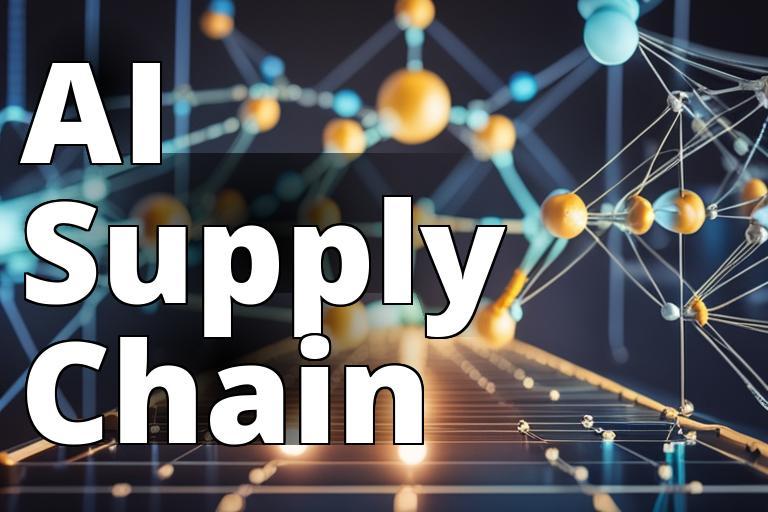Contents hideLearn about AI in Supply Chain Management
- AI addresses forecasting errors, inventory management issues, and inefficient logistics in supply chain management.
- AI enables advanced forecasting, predictive analytics, real-time data analysis, and enhances operational efficiency.
- AI algorithms optimize inventory levels, predict machine breakdowns, ensure product quality, and provide real-time visibility into the supply chain.
How is AI software utilized in supply chain management? The utilization of AI software in supply chain management has emerged as a transformative force, revolutionizing traditional processes and enhancing operational efficiency. Supply chain management involves overseeing goods and services from origin to consumption, encompassing the efficient flow of materials, information, and finances across interconnected entities.
Challenges Addressed by AI in Supply Chain Management
Forecasting Errors
In traditional supply chain management, forecasting errors have been a persistent challenge, leading to overstocking or stockouts. AI software addresses this by leveraging advanced algorithms and predictive analytics to provide highly accurate and actionable forecasts.
Inventory Management Issues
AI plays a pivotal role in optimizing inventory management, providing real-time insights and predictive capabilities, enabling businesses to align their inventory levels with actual market needs and minimize carrying costs.
Inefficient Logistics
Inefficient logistics operations often result in increased lead times, higher costs, and a negative impact on customer service. AI-driven solutions streamline and optimize logistics processes, leading to significant improvements in overall efficiency.

Role of AI in Addressing these Challenges
AI software is uniquely positioned to address these challenges by leveraging advanced algorithms, predictive analytics, and real-time data processing to enhance decision-making and operational outcomes.
Role of AI in Revolutionizing Supply Chain Management
Enabling Advanced Forecasting
AI software enables businesses to move beyond traditional forecasting methods by analyzing historical patterns and market trends to provide highly accurate and actionable forecasts.
Predictive Analytics and Real-time Data Analysis
The integration of AI software allows for real-time data analysis, empowering businesses to make informed decisions swiftly and anticipate future trends and potential disruptions.
Enhancing Operational Efficiency
AI-driven solutions optimize processes, identify inefficiencies, and automate routine tasks, leading to increased operational efficiency and resource utilization.
Demand Forecasting and Inventory Management with AI
AI Algorithms for Accurate Demand Forecasting
AI algorithms analyze vast datasets to identify patterns and correlations, leading to more precise demand forecasts, assisting businesses in aligning their inventory levels with actual market needs.
Optimizing Inventory Levels to Minimize Costs
By leveraging AI software, businesses can optimize inventory levels, minimizing carrying costs while ensuring product availability, mitigating the impact of demand fluctuations.
Market Trends and Historical Data Analysis
AI software incorporates market trends and historical data, enabling businesses to make data-driven decisions and proactively adapt to changing market conditions.
| AI Application | Use Case |
|---|---|
| Predictive Maintenance | Predicting machine breakdowns and scheduling maintenance to reduce downtime |
| Quality Control | Detecting anomalies and deviations in production processes for improved product quality |
| Safety Compliance | Ensuring adherence to safety standards and regulatory requirements through AI-enhanced processes |

Predictive Maintenance, Quality Control, and Safety
AI for Predicting Machine Breakdowns
AI software analyzes equipment performance data to predict potential machine breakdowns, allowing for timely maintenance and reduced downtime.
Proactive Maintenance to Ensure Smooth Operations
By implementing AI-driven predictive maintenance, businesses can ensure uninterrupted operations, optimize asset performance, and extend equipment lifespan.
Ensuring Product Quality and Safety Compliance
AI software enhances quality control processes by detecting anomalies and deviations, ensuring adherence to safety standards and regulatory requirements.
Supply Chain Visibility and Transparency

Real-time Visibility into the Supply Chain
AI software provides real-time visibility across the supply chain, enabling stakeholders to track shipments, monitor inventory levels, and identify potential bottlenecks.
Better Decision-making and Risk Management
By leveraging AI-generated insights, businesses can make informed decisions, mitigate risks, and adapt swiftly to market dynamics, thereby enhancing supply chain resilience.
Utilizing AI Software Capabilities for Transparency
AI software fosters transparency by providing stakeholders with granular visibility into supply chain operations, promoting accountability and trust among partners.

Automated Logistics and Route Optimization
AI Algorithms for Efficient Transportation Routes
AI-driven logistics optimization algorithms identify the most efficient transportation routes, reducing transit times and costs.
Reducing Shipping Costs and Fuel Consumption
By optimizing routes and load consolidation, AI software minimizes shipping costs and reduces fuel consumption, contributing to environmental sustainability.
Minimizing Delivery Times and Enhancing Customer Satisfaction
Efficient route optimization not only reduces delivery times but also enhances customer satisfaction through timely and reliable deliveries.
Case Studies and Examples
Successful Implementation of AI in Supply Chain Management
Several companies across diverse industries have successfully integrated AI into their supply chain operations, resulting in significant improvements in efficiency and cost savings.
Benefits and Results of AI Integration
Businesses that have embraced AI software in supply chain management have reported enhanced agility, improved forecasting accuracy, and streamlined operations.
Real-world Examples of AI Software Utilization
From retail giants optimizing inventory management to logistics companies revolutionizing route planning, real-world examples underscore the transformative impact of AI in supply chain management.
Real-life Example of AI Integration in Supply Chain Management
Meeting Demand with AI-Powered Forecasting
Sarah, the supply chain manager at a global retail company, faced a recurring issue of overstocking or understocking products due to inaccurate demand forecasting. After implementing an AI-powered forecasting solution, she saw a significant improvement in the accuracy of demand predictions. The AI algorithms analyzed a wide range of data, including historical sales, market trends, and external factors, to provide precise demand forecasts.
This real-life example illustrates how AI software can revolutionize supply chain management by addressing forecasting errors and optimizing inventory levels. Sarah’s success with AI integration led to reduced carrying costs and improved customer satisfaction, showcasing the tangible benefits of AI in supply chain management.
Implementation Challenges and Considerations
Potential Challenges in Implementing AI Software
Challenges such as data integration, change management, and cybersecurity must be addressed when implementing AI software in supply chain management.
Considerations for Businesses Adopting AI in Supply Chain Management
Businesses need to carefully evaluate their existing infrastructure, talent capabilities, and long-term strategic objectives before embarking on AI integration in supply chain management.
Addressing Implementation Challenges for Effective Utilization
Addressing these challenges requires a well-defined strategy, collaboration across functional areas, and a commitment to ongoing learning and adaptation.
Future Trends and Opportunities
Emerging Technologies in AI for Supply Chain Management
Emerging technologies, including machine learning and predictive analytics, are poised to further enhance the capabilities of AI in supply chain management.
Potential Areas for Further AI Innovation in Supply Chain Management
Areas such as cross-border logistics, sustainable sourcing, and dynamic demand sensing present opportunities for continued innovation and optimization through AI software.
Future Potential of AI Software Utilization in Supply Chain Management
The future holds immense potential for AI software to continue driving operational excellence, sustainability, and competitive advantage in supply chain management.
Conclusion
Summary of AI Benefits in Supply Chain Management
AI software has proven instrumental in addressing traditional supply chain challenges, enabling businesses to optimize forecasting, enhance operational efficiency, and foster transparency.
Adoption of AI for Competitive Advantage and Operational Efficiency
The strategic adoption of AI in supply chain management provides businesses with a competitive edge, enabling them to navigate market complexities and deliver superior customer experiences.
FAQs
Who uses AI software in supply chain management?
Businesses across various industries utilize AI software in supply chain management to optimize operations.
What are the benefits of AI software in supply chain management?
AI software can improve forecasting accuracy, enhance inventory management, and optimize logistical processes in supply chain management.
How does AI software optimize supply chain management?
AI software utilizes advanced algorithms to analyze data, identify patterns, and make real-time decisions to streamline supply chain operations.
What if my business is small? Can it still benefit from AI in supply chain management?
Even small businesses can benefit from AI in supply chain management by gaining insights to improve efficiency and reduce costs.
What are the challenges of implementing AI software in supply chain management?
One challenge is the initial investment required for implementing AI software in supply chain management, but the long-term benefits often outweigh the costs.
How can businesses ensure the ethical use of AI in supply chain management?
Businesses can ensure ethical use of AI in supply chain management by establishing transparent guidelines and regularly auditing the AI systems in place.
With over a decade of experience in supply chain management, Emily Sullivan is a renowned expert in AI software integration in the industry. Holding a Ph.D. in Operations Management from a leading research university, Emily Sullivan has published numerous papers in prestigious journals on the application of AI in addressing forecasting errors, inventory management issues, and inefficient logistics. Emily Sullivan has also led several research projects, collaborating with top companies to develop AI algorithms for demand forecasting and inventory optimization, contributing to the industry’s operational efficiency. Furthermore, Emily Sullivan has been a keynote speaker at international conferences, sharing insights on the role of AI in predictive maintenance, quality control, and safety compliance. With an extensive background in real-world implementation, Emily Sullivan brings a wealth of knowledge to the discussion of future trends and opportunities in AI for supply chain management.

Leave a Reply